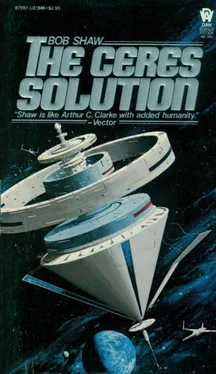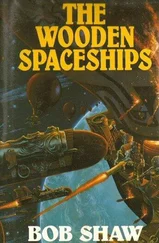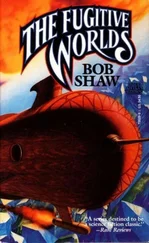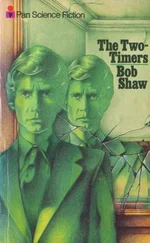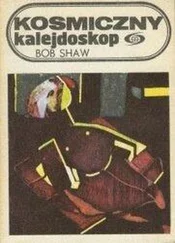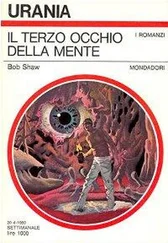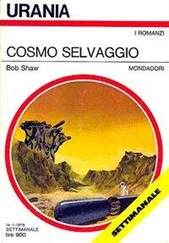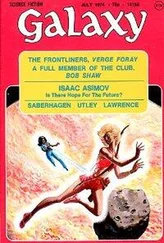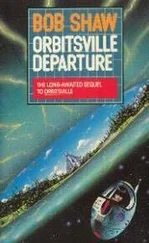They reached the centre of the radial mosaic. Hargate, now familiar with basic skording procedure, stopped his chair and extended his right hand to Vekrynn. The Mollanian advanced his own hand slowly and with obvious reluctance until the contact was made, then he closed his eyes. In spite of Hargate’s mental and physical tiredness he felt a surge of excitement at the prospect of once more making that miraculous leap across space, of achieving what no reasonable member of his race could ever have expected to achieve. He scanned his surroundings, taking in every detail of the exotic scene, trying to anticipate the instant at which everything would change. The ruined buildings shimmered in the hot air, and the forest beyond was a bedazzling amber fire which challenged the senses, and in the midst of the brilliance something seemed to move. Hargate blinked rapidly and tried to focus his eyes on what might have been a dust devil or a fragment of mirage…
The transfer took place.
It was mellow evening on a world where the air had an incredible glassy clarity.
From the hummock on which he was sitting Hargate could see streams, wooded areas, plains, lakes, and mountains which did not act as a barrier to sight, but which receded in range after range in such a way that trying to follow them with the eye induced a giddy sensation of flight. Hargate was conscious of never having seen so much at one time, of the new world crowding itself into his head, expanding his mind. He rolled his chair forward a few paces, unable to do anything but gape, then—with an abrupt narrowing of perception—realised that the ground beneath his wheels was a springy lime-green turf.
For an instant he was unable to decide why the sight of it had produced stirrings of unease, then it dawned on him that he had been expecting to find one of the radial mosaics used by the Mollanians to mark the “stations” in their transportation network. He had also been expecting to find at least some of the amenities of civilisation, and their total absence suggested that either Gretana or Vekrynn had lied to him.
Hargate turned in his seat, barely in time to see Vekrynn complete a Mollanian mnemo-curve and cease to exist.
“Come back, you…!” He rolled towards the spot where Vekrynn had been standing, momentarily unable to accept what had happened, then brought the chair to a halt and looked around him, seeing the vast, calm world in a different light. Its predominant feature now was its sheer reverberating emptiness.
“Looks like I was right about you the first time, Vekrynn,” he said aloud, and immediately resolved not to speak again. The stillness of the environment had engulfed his words, absorbing their vibrational energies, symbolically confirming his belief that he was the only human being on the entire face of the planet.
In retrospect it was obvious that Vekrynn had wanted him out of the way, permanently silenced. The Mollanian had been too squeamish to carry out a straightforward homicide, but with the fantastic powers at his disposal such physical crudities were quite unnecessary. By abandoning Hargate on an uninhabited world—presumably one which was never visited by other members of his race—he had eliminated him as effectively as a soldier could have done with a machine gun. This way would take a little longer, that was all—exactly how much longer depending on whether death came by starvation, exposure or…
How big would an animal have to be before I could spot its traces?
How big would an animal have to be to do me in?
And, while we’re at it, is there any guarantee that I could even recognise an extraterrestrial animal even if it was staring me straight in the balls?
Hargate glanced towards a group of palm-like trees a short distance away to his left and considered taking shelter among them, then came the disquieting realisation that other creatures might have had the same idea. There was even the further possibility, one he was in no position to discount, that the trees themselves could be dangerous. All he knew for certain about the nameless world on which he found himself was that his present location offered no urgent or obvious threat—therefore there was no point in moving away.
There was no point in doing anything at all, not even in feeling anger or hatred towards a man who had retreated light years beyond his reach; not even in trying to emulate the Mollanian transfer symbols, which were only a reflection of precise and subtle mental processes. Earlier he had wished for peace in which to reflect on the events of the long day, and now—like the granting of a final request—he had been absolved of every one of life’s petty obligations.
He turned his chair to face the sinking sun and locked his wheels. The silence pressed down all around him, from horizon to distant horizon, as he turned up his collar, squirmed into a more comfortable position and waited for the appearance of alien constellations.
He had all the time in the world in which to think.
Lorrest tye Thralen, in spite of his many years on Earth, had never quite shaken off his Mollanian fear of heights. He could recall with amusement his earliest decades in Eyrej province, when he too would never have considered running without first donning an exercise mask to protect his face in the event of a fall. In his opinion that was one of the more ludicrous of his people’s foibles, evidence of their obssessive preoccupation with physical beauty as expressed in the Twenty Rubrics of the Lucent Ideal.
He had often told himself that the acrophobia which was universal on Mollan, making buildings of more than one storey extremely rare, was merely an extension of the same attitude, that the principal reason for it was the dread of what the impact with the ground could do to face and form. That being the case, he—who had scrupulously discarded all that was petty and parochial in his upbringing—should have been able to perch on a high ledge with the same equanimity he showed in, say, driving a car. But it had not worked out that way.
A short distance beyond the window of his fifth-floor hotel room were the rusting beams of an adjoining steel-framed building which had never been completed. At times he would stand for long periods by the window, concentrating all his attention on the reality of the beams, bringing their flanges and cleats and welds into intensely sharp focus against the blurry background of the street, but no matter how he tried he was never able to identify himself with the construction workers who had routinely put the steelwork in place. And as for the men who ventured far higher, the erection crews on skyscrapers, their minds and lives were beyond his comprehension.
A common Mollanian rationalisation was that, with only a few decades of life at stake, the Terrans could be much more casual about the risk of death, but Lorrest was inclined to reverse that reasoning. The shorter the term of life the more precious each day had to be, and the physical courage often displayed by Terrans—as compared to the cautious nature of the average Mollanian—was another indication that they had begun to differ generically from the interstellar human stock. Against all the odds, the savage riptide of lunar forces which played havoc with their initial genetic structuring had created something positive in addition to all the predictable malaises. That vital essence was worth preserving, as far as Lorrest was concerned, no matter how great the cost or effort…
He was standing by the window, watching dust motes march and countermarch in a ray of lemon-coloured sunlight, when his telephone sounded at precisely the arranged hour. He allowed it to bleep eight times, part of the 2H identification code, then picked up the instrument and slipped a scrambler disc into place across the mouthpiece.
Читать дальше
